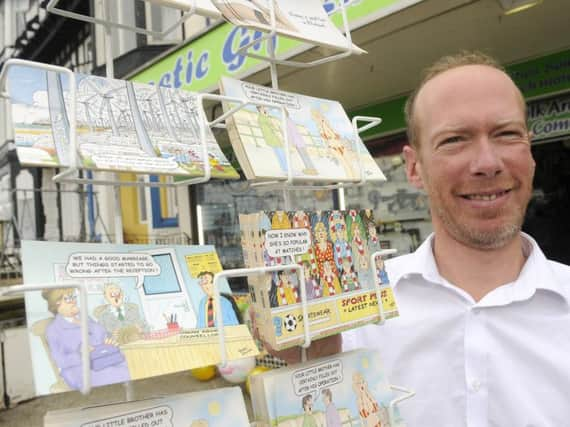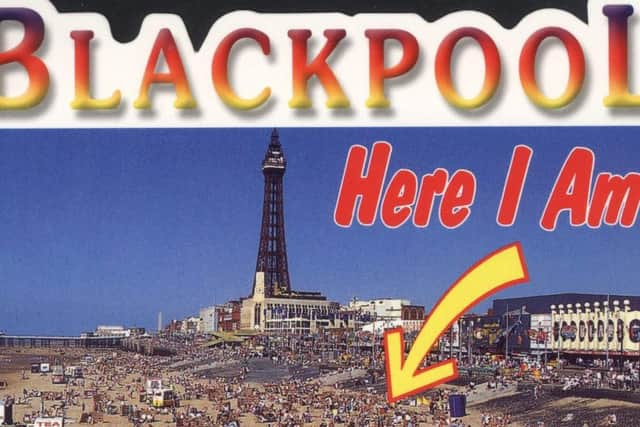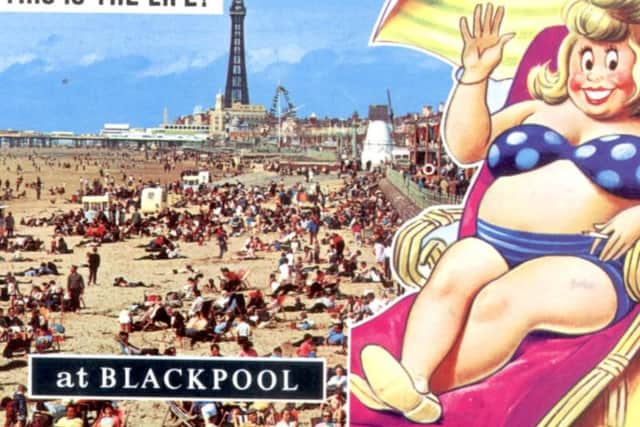The traditional Blackpool postcard faces a bleak future


How many times has that been written on holiday postcards flying round the country from Blackpool?
But not for much longer if the trend for posting pictures on Facebook instead of putting a card in the postbox continues.
Advertisement
Hide AdAdvertisement
Hide AdSuch is the decline in folk buying postcards, that one of the oldest manufacturers in the country has announced it is to close.


UK publisher J.Salmon, based in Kent, which has been publishing postcards and calendars since 1880, will shut in December.
It says instead of penning a note, people are putting photos up on Facebook or Instagram or using WhatsApp to show friends and family at home just how much fun they’re having.
But Blackpool gift shop owner John Yates says tourists visiting his shop on South Promenade still want to buy a postcard of the resort.
However he now struggles to find a supplier.


Advertisement
Hide AdAdvertisement
Hide AdJohn, who has run Fantastic Gifts opposite South Pier since 1971, said: “Every day people come in asking for a Blackpool postcard, but we just can’t get them.
“People still want a view of the Tower or the trams. Older people still send postcards while some just want one as a souvenir.
“They haven’t died a death, it’s just we can’t get them.
“You can still buy postcards of scenes in London and the Lake District, so why not Blackpool? We get millions of visitors a year so there is still scope for it.


“We used to sell thousands every year.
“Now we just have the Bamforths funny seaside ones.
“It’s the same with calendars. No-one is producing those anymore either, but people still want them.”
Advertisement
Hide AdAdvertisement
Hide AdThe humble postcard was hugely popular at the start of the 20th century when, according to former local history librarian Tony Sharkey, six hundred million were posted in Great Britain in 1903.


In those days, there were so many postal deliveries it was possible to send a message by post which would reach the recipient early the next morning.
Tony, who helped curate the postcard archive at Blackpool’s Central Library before he retired, said: “They were often the equivalent of what would in later years be a phone call, or today perhaps be a text.
“Messages such as ‘Dear Betty - I’ll see you for lunch tomorrow at 12.30’ are still commonly seen on old cards. The Post Office was a pillar of reliability.
Advertisement
Hide AdAdvertisement
Hide Ad“In those days it cost half a penny to send a postcard, compared with one penny for a letter.
“The sending of picture postcards from seaside resorts to friends and neighbours was common from the early years of the 20th century.
“Even in those early days the images ranged from traditional seaside views to seaside humour and sauciness.
“The Central Library in Blackpool holds a fine collection of early 1950s postcards that were barred from sale in town by the Blackpool Censorship Board because the humour was considered to be too saucy for local decency.
Advertisement
Hide AdAdvertisement
Hide Ad“The seaside picture postcard has had a long and happy life, and its decline has no doubt been inevitable.
“But it would be lovely to think there may still be a niche market out there for somebody, after all there is still something special about a postcard through a good old-fashioned letterbox.”
J. Salmon originally started out as a stationer’s shop and general printing business.
Brothers Charles and Harry Salmon, the fifth generation of their family postcard firm, said the popularity of social media had had a huge impact on the business.
Advertisement
Hide AdAdvertisement
Hide AdThe increase in people taking shorter holidays also means folk are likely to have arrived home long before their postcards.
In a letter to suppliers and newsagents, the brothers wrote: “Increasingly challenging trading conditions and changes to the nature and size of the market for its publications have resulted in uncertainty over the viability of its trade.”
According to travel historian Jordan Girardin the number of postcards sold each year has slumped to about five million from 20 million just 25 years ago.
He said: “The cheap postcard that we use just to send a message has been replaced by social media I’m afraid.”